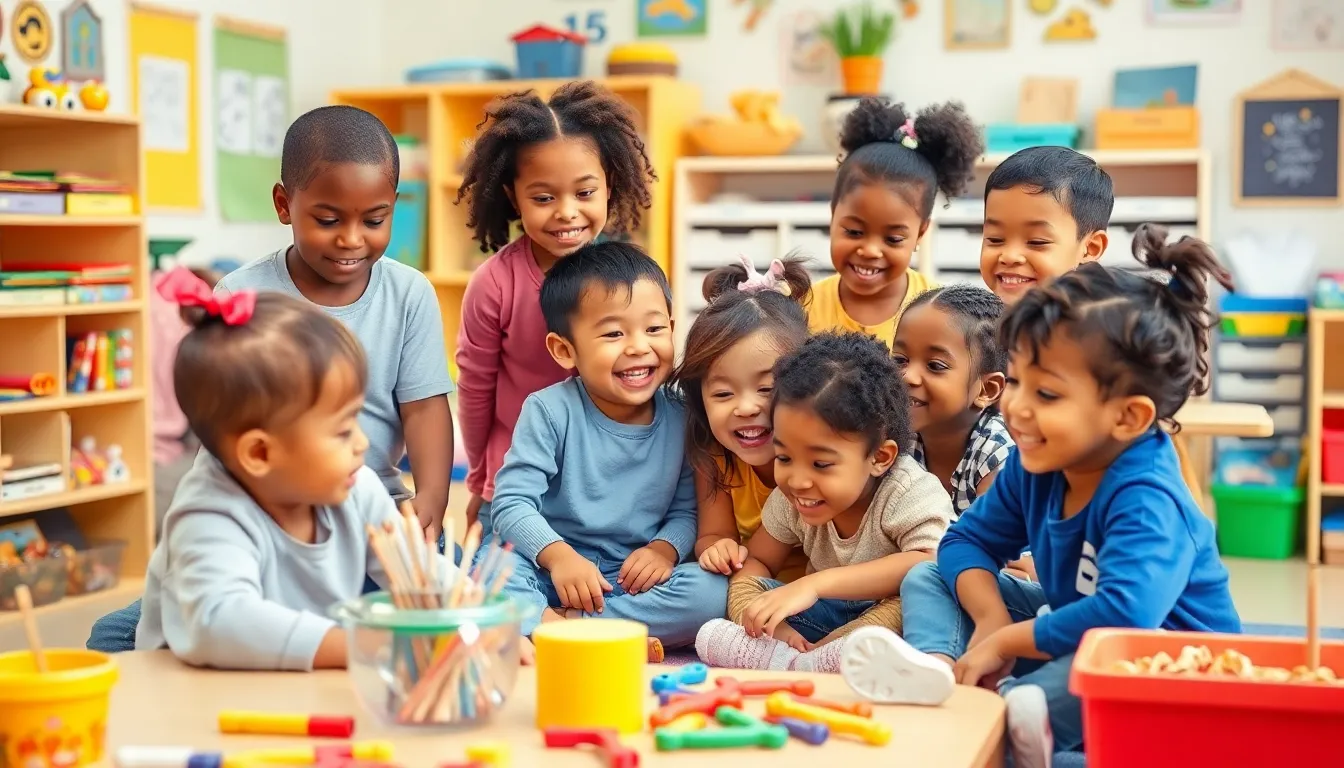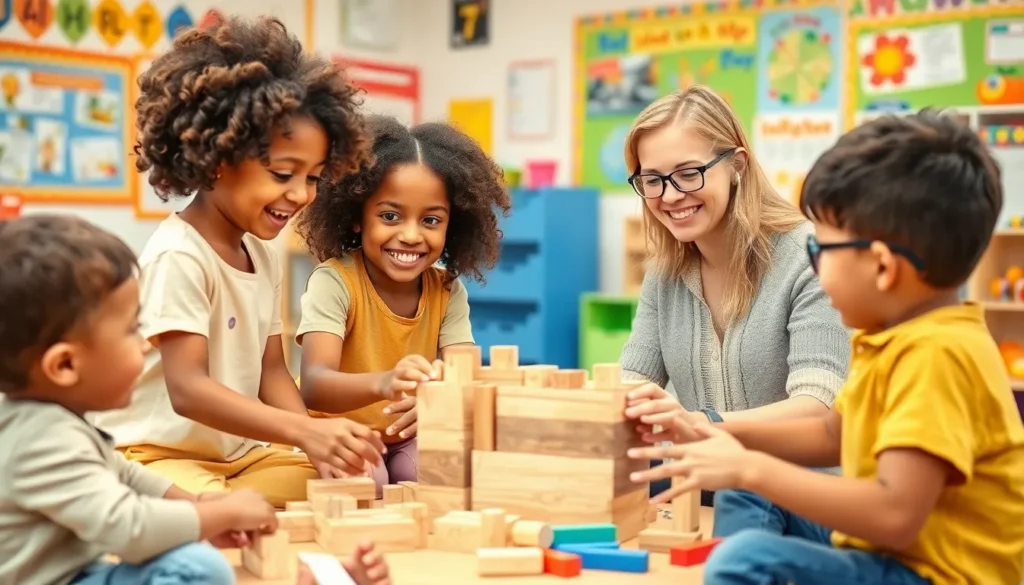Early childhood education classes aren’t just a fancy way to keep kids busy while parents sip their coffee. They’re the secret sauce that sets the foundation for lifelong learning, creativity, and social skills. Imagine a world where children explore, play, and learn in an environment designed just for them—sounds like a dream, right? Well, it’s a reality thanks to these classes that make learning feel like a fun adventure.
Table of Contents
ToggleImportance Of Early Childhood Education Classes
Early childhood education classes play a vital role in shaping a child’s future. These classes not only provide learning opportunities but also create a foundation for overall growth.
Benefits For Child Development
Early childhood education classes enhance cognitive skills, fostering critical thinking and problem-solving abilities. Social interactions in these settings lead to improved emotional regulation and communication skills. Physical activities promote coordination and motor skills. Engaging in play-based learning encourages creativity and curiosity, as children explore their interests in a supportive environment. Nurturing relationships with educators provide children with consistent guidance and encouragement.
Long-Term Impact On Learning
Children who participate in quality early childhood education are more likely to excel academically in later years. Research shows they demonstrate better performance on standardized tests and maintain higher graduation rates. Social skills gained during these formative years contribute to successful interactions in diverse environments. Educational experiences cultivate a love for learning that often lasts a lifetime. Exposure to structured learning paves the way for effective study habits and increased motivation in pursuing higher education.
Types Of Early Childhood Education Classes

Various types of early childhood education classes exist to cater to diverse learning needs. These classes facilitate foundational skills through structured and engaging activities.
Formal Education Settings
Formal education settings include pre-kindergarten programs, preschools, and kindergartens. Pre-kindergarten programs typically operate under state regulations and focus on school readiness through a structured curriculum. Preschools offer half-day sessions that emphasize socialization, basic academics, and play-based learning. Kindergartens provide a transition to elementary school, blending formal instruction with child-centered activities. These environments encourage cognitive development and foster social interactions among peers. Additionally, educators in formal settings often possess specific training in child development, which enhances the learning experience.
Informal Learning Environments
Informal learning environments encompass family childcare, playgroups, and community programs. Family childcare allows children to learn in smaller groups within home settings, providing a nurturing and personalized approach. Playgroups often emphasize social skills through unstructured play, promoting creativity and exploration among children. Community programs frequently engage with local resources, offering diverse learning experiences through arts, science, and nature activities. Each of these informal settings supports children’s development while providing flexibility and varied interaction opportunities, contributing to their overall growth.
Curriculum Focus In Early Childhood Education
Early childhood education classes center on a well-rounded curriculum that enriches various aspects of child development. Core subjects and social-emotional learning serve as foundational elements in these programs.
Core Subjects
Language arts, mathematics, science, and social studies play key roles in early childhood education. Engaging activities, like storytelling and counting games, enhance literacy and numeracy skills. Children explore scientific concepts through hands-on experiments, fostering curiosity and critical thinking. Social studies introduce them to diverse cultures, promoting awareness and appreciation of global perspectives. Each subject relates closely to children’s everyday experiences, ensuring relevance and increasing retention of knowledge.
Social and Emotional Learning
Social and emotional learning focuses on developing interpersonal skills and emotional intelligence. Children learn to recognize their feelings and those of their peers within collaborative environments. Interactive games encourage communication, cooperation, and conflict resolution. Structured classroom routines provide security, helping kids understand the value of consistent relationships with educators. As a result, children build resilience and empathy, essential traits for future success.
Choosing The Right Early Childhood Education Class
Selecting the right early childhood education class requires careful consideration of multiple factors. Parents should evaluate the class size, ensuring a low student-to-teacher ratio for personalized attention. Location matters; proximity to home or work can ease daily logistics. Curriculum options also require inspection; classes focusing on both academic and social-emotional learning promote comprehensive development.
Factors To Consider
Class structure plays a vital role. Structured environments often foster academic skills, while play-based settings support creativity. Assess the qualifications and experience of educators. Trained professionals bring expertise that enhances the learning experience. Additionally, consider the safety measures in place. Secure facilities contribute significantly to a child’s well-being and peace of mind for parents. Finally, check for accreditation; accredited programs typically adhere to quality standards recognized nationally.
Questions To Ask Educators
Asking the right questions can reveal a program’s strengths. Inquire about curriculum specifics; knowing how subjects are integrated demonstrates educational intent. Next, ask how educators assess children’s progress. This feedback is crucial for understanding developmental milestones. Additionally, discuss the educator-to-child interaction style. This aspect shows how supportive and nurturing the environment is. Find out about parent involvement opportunities, as active participation fosters strong home-school connections. Lastly, clarify any policies on discipline and behavior management; understanding these practices aligns expectations between parents and educators.
Early childhood education classes lay a strong foundation for children’s future success. They provide essential opportunities for growth in cognitive skills, emotional regulation, and social interaction. By engaging in diverse learning environments, children develop a love for learning that lasts a lifetime.
Parents play a crucial role in selecting the right program that aligns with their child’s needs. Understanding the various options available empowers them to make informed decisions. Ultimately, investing in quality early education reaps long-term benefits, setting children on a path toward academic achievement and personal development.





